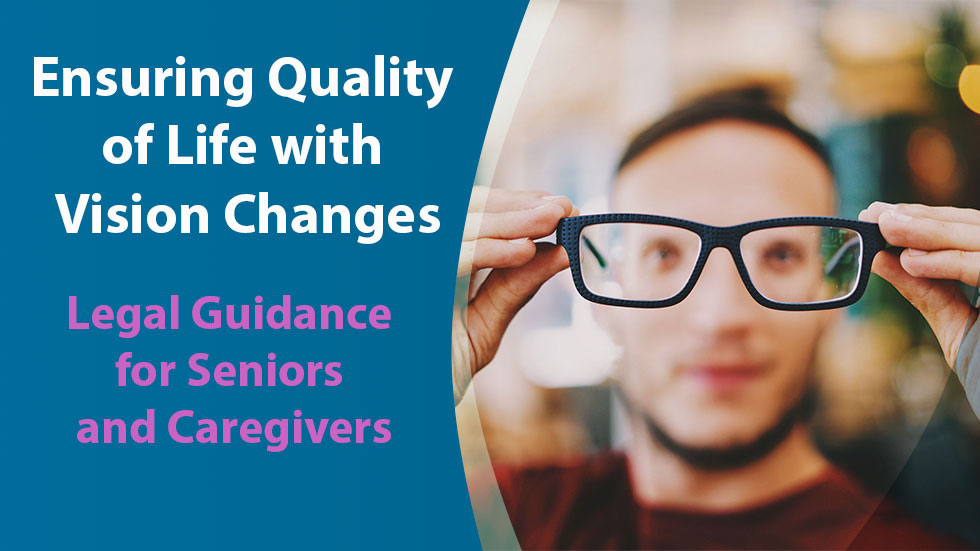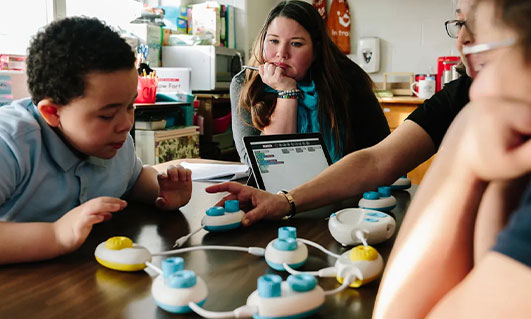
As we age, changes in vision can impact various aspects of life, from performing daily tasks to enjoying social activities and staying independent. Fortunately, seniors facing vision challenges have access to legal resources and protections to help maintain their quality of life. This blog delves into common vision changes in old age and highlights legal resources, support programs, and tools available to ensure independence and well-being.
Understanding Vision Changes in Old Age
Vision changes in seniors often include conditions like cataracts, glaucoma, macular degeneration, and diabetic retinopathy. These can result in symptoms such as blurry vision, difficulty seeing in low light, loss of central vision, and even blindness. The impact of these conditions can be profound, affecting not only physical health but also emotional well-being and social interactions.
Early awareness and proactive planning are essential for seniors to manage these changes effectively. In addition to medical resources, several legal supports exist to protect the rights and enhance the quality of life for seniors dealing with vision loss.
Legal Protections for Seniors with Vision Impairments
Disability Rights and Accessibility
In many countries, including India, the United States, and the European Union, disability rights laws protect the rights of seniors with vision impairments. These laws, such as the Americans with Disabilities Act (ADA) in the U.S. and the Rights of Persons with Disabilities Act in India, mandate equal access to public spaces, transportation, and communication tools. For example, public facilities must provide reasonable accommodations such as braille signage, accessible websites, and audio aids, ensuring that seniors with vision impairments can access essential services and public spaces.
Health Care and Vision Support
Healthcare access is a critical component of maintaining quality of life for seniors with vision changes. In the United States, Medicare covers certain vision-related procedures, including cataract surgery. In India, government initiatives like the National Programme for Control of Blindness (NPCB) focus on reducing preventable blindness through screenings, free surgeries, and distribution of eyeglasses for seniors with vision impairments. Understanding these benefits helps seniors and their caregivers make informed decisions about eye care.
Advance Directives and Health Power of Attorney
When facing progressive vision loss, it’s helpful for seniors to establish an advance directive or health power of attorney. These legal documents allow individuals to designate a trusted person to make healthcare decisions on their behalf if they become unable to do so. This ensures that their medical preferences are respected, including their choices regarding eye care, surgeries, or assistive devices, offering peace of mind for both seniors and their families.
Elder Abuse Protections
Seniors with vision impairments are sometimes at an increased risk of abuse, including financial, emotional, and physical abuse. Elder abuse laws exist to protect vulnerable seniors and provide them with resources to report mistreatment. In India, the Maintenance and Welfare of Parents and Senior Citizens Act addresses elder abuse and provides legal recourse to seniors who may be neglected or exploited by caregivers. Seniors and their families can access legal aid services and elder abuse helplines to ensure their safety and rights.
Support Programs and Resources for Seniors with Vision Changes
Government Programs for Low-Income Seniors
Many governments offer support programs to assist low-income seniors with vision impairments. In the U.S., Supplemental Security Income (SSI) provides financial assistance to eligible seniors, while Medicaid covers some healthcare costs, including vision-related expenses. In India, social welfare programs and NGOs help provide financial aid and resources, such as free cataract surgeries and vision aids, for low-income seniors.
Nonprofits and Community Organizations
Nonprofit organizations play a significant role in supporting seniors with vision impairments. Organizations such as the American Foundation for the Blind (AFB) and India’s National Association for the Blind (NAB) offer services like vision rehabilitation, mobility training, and assistive technology guidance. These programs can provide seniors with tools and training to help them navigate life with vision changes, improving their independence and confidence.
Assistive Technologies and Accessibility Tools
Assistive technologies have come a long way in helping seniors with vision impairments live independently. Screen readers, magnifying devices, text-to-speech apps, and devices with voice command options can aid seniors in reading, communicating, and managing daily tasks. Many local government agencies, libraries, and nonprofits offer classes or financial assistance to help seniors acquire and use these technologies.
Social and Emotional Support Networks
Support groups and counseling services are available for seniors adjusting to vision changes. Vision loss can lead to feelings of isolation, depression, and anxiety, but connecting with peers who understand these experiences can provide emotional relief and practical advice. Many community centers, nonprofits, and senior advocacy organizations host support groups where seniors can discuss their challenges and successes in a compassionate setting.
Steps for Seniors and Caregivers
Educate Yourself: Staying informed about your legal rights, healthcare options, and support resources is empowering and allows you to make proactive choices.
Plan for Healthcare Needs: Reviewing healthcare options, insurance coverage, and potential surgeries or assistive devices can prevent financial and logistical stress later.
Connect with Support Services: Take advantage of government programs, nonprofits, and local support groups that provide resources for seniors with vision impairments.
Engage in Technology Training: Learning to use assistive technology can greatly enhance daily life. Many community centers offer free or discounted classes for seniors.
Seek Legal Advice if Needed: Elder law attorneys can assist with advance directives, financial planning, and understanding elder abuse protections, ensuring you have the proper legal documentation in place.
Conclusion
Aging with vision changes doesn’t mean compromising on quality of life. By understanding and accessing the available legal resources, support programs, and assistive technologies, seniors can navigate vision loss with resilience and dignity. In addition to medical treatment, legal rights and community resources can empower seniors to live independently and remain active members of their communities. By planning ahead and connecting with available resources, seniors can continue to enjoy their golden years with confidence and peace of mind.





